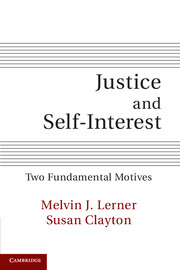Book contents
- Frontmatter
- Contents
- List of Figures and Tables
- Preface
- 1 Contesting the Primacy of Self-Interest
- 2 Why Does Justice Matter? The Development of a Personal Contract
- 3 Commitment to Justice: The Initial Primary Automatic Reaction
- 4 Explaining the Myth of Self-Interest
- 5 Defining the Justice Motive: Reintegrating Procedural and Distributive Justice
- 6 How People Assess Deservingness and Justice: The Role of Social Norms
- 7 Integrating Justice and Self-Interest: A Tentative Model
- 8 Maintaining the Commitment to Justice in a Complex World
- 9 Bringing It Closer to Home: Justice in Another “American Tragedy”
- 10 Emotional Aftereffects: Some Negative Consequences and Thoughts on How to Avoid Them
- References
- Author Index
- Subject Index
10 - Emotional Aftereffects: Some Negative Consequences and Thoughts on How to Avoid Them
Published online by Cambridge University Press: 03 May 2011
- Frontmatter
- Contents
- List of Figures and Tables
- Preface
- 1 Contesting the Primacy of Self-Interest
- 2 Why Does Justice Matter? The Development of a Personal Contract
- 3 Commitment to Justice: The Initial Primary Automatic Reaction
- 4 Explaining the Myth of Self-Interest
- 5 Defining the Justice Motive: Reintegrating Procedural and Distributive Justice
- 6 How People Assess Deservingness and Justice: The Role of Social Norms
- 7 Integrating Justice and Self-Interest: A Tentative Model
- 8 Maintaining the Commitment to Justice in a Complex World
- 9 Bringing It Closer to Home: Justice in Another “American Tragedy”
- 10 Emotional Aftereffects: Some Negative Consequences and Thoughts on How to Avoid Them
- References
- Author Index
- Subject Index
Summary
In Chapter 7, we laid out a model that begins to describe how multiple motives are integrated. The justice motive theory is probably unique among dual-process theories in proposing that people in every encounter initially engage in preconscious processing of cues that define who deserves what from whom. If those encoded cues indicate that a person's deservingness is violated or in jeopardy they will automatically elicit justice imperatives: emotion-directed efforts to correct the injustice. Subsequent to this initial response, the person may engage in thoughtful, norm-dominated processing of motivationally relevant salient cues. In order for this secondary controlled processing to occur, there must be sufficient cognitive resources remaining after the person's initial automatic responses for him or her to attend to, and process, salient incentives and alternative courses of action: the greater the salient incentives and subsequent thoughtful deliberations, the greater the probability that some form of normatively appropriate self-interest rather than a justice imperative will shape the person's decisions and behavior.
It is obvious and important that people are often able to exert self-control and arrive at “wise” decisions concerning the most enlightened rational courses of action even while they are experiencing the presence of emotion-laden imperatives. The weaker the initial arousal and the more serious the perceived outcomes at stake, the greater the time and efforts employed to arrive at a wise or at least reasonable response.
- Type
- Chapter
- Information
- Justice and Self-InterestTwo Fundamental Motives, pp. 220 - 246Publisher: Cambridge University PressPrint publication year: 2011

